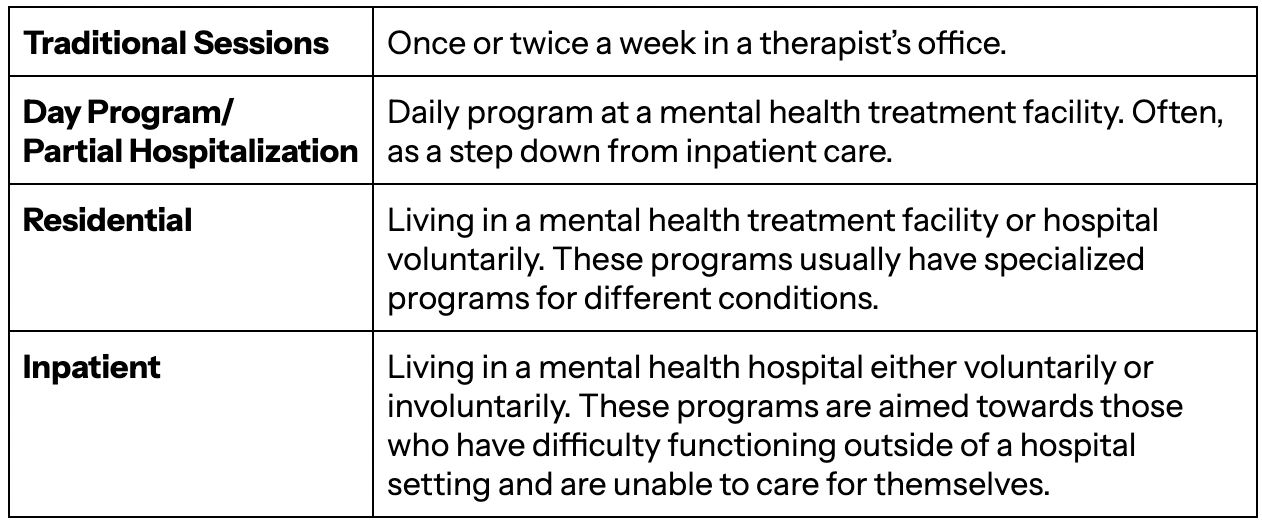What is IOP Therapy?
.webp)
By: Kaitlyn DeStefano, B.A., Sophy Kaplan, B.A., Sony Khemlani-Patel, PhD.
When someone is struggling with mental health issues, finding the right level of care is crucial. Whether you’re navigating your own mental health journey or supporting someone else, understanding the different levels of care can make all the difference. One level of care that has become a major talking point within healthcare is an Intensive Outpatient Program (IOP).
What is an Intensive Outpatient Program (IOP)?
An Intensive Outpatient Program (IOP) is a structured mental health treatment that allows individuals to continue living at home while receiving intensive care. There are many types of IOPs. They vary by the type of institution providing the care. For example, a hospital based IOP program may consist of daily treatment consisting of both group and individual therapy, medication management, and job support services. Often a hospital based IOP is a step down from an inpatient stay.
Specialized IOP programs, such as for OCD, typically consist of frequent sessions and extensive support from a dedicated mental health care team providing evidence-based treatment. Many programs consist of a set schedule of treatment with a combination of group and individual therapy. A much smaller select set of programs around the country, such as at Bio Behavioral Institute, consist of individual therapy sessions on a frequency that best meets the patient’s needs. The key component of this kind of program is the outpatient facility setting. Outpatient facilities are healthcare settings where patients can receive treatment or services without having to stay overnight.
Who is an IOP For?
IOPs can be helpful for individuals who:
- Have a need for structured therapeutic services for a mental health condition.
- Have tried individual therapy at a less intensive frequency in the past and did not attain their goals.
- Are transitioning out of inpatient care or residential treatment programs.
- Struggle to function in their daily life.
- Want to achieve their mental health-related goals during a set time period in order to return to their daily life, such as a medical leave of absence from work or during a vacation from college.
- Need assistance to maintain recovery while living outside of a residential facility.
There are IOPs targeted for different mental health conditions, with some programs being condition-specific. There are also IOPs for individuals of any age, or for a specific age group. Treatment is not limited to a set group of people, all that has to be done is find the program that is right for you!
Day-in-the-Life of an IOP
IOP schedules change according to the specific needs of the individual and the program itself. However, there are a few attributes that are common amongst these programs:
- 3-5 days/week of therapy
- 9–25 hours of treatment per week
- Individual and group sessions vary in length and frequency by program
- Extended individual sessions, allowing for more hands on skills practice
- Typically run for 4-12 weeks
Do IOPs Work?
Yes! IOPs are effective, especially for those who find the right program for their needs.
Intensive treatments lead to a faster decline in mental health-related symptoms. More individuals within intensive settings achieve clinically significant improvements after the completion of their treatment programs. They have also been found to be a protective factor from future mental health symptom relapse.
How are IOPs Helpful?
IOPs allow for a balanced approach to recovery that is suitable for individualized needs. It allows for a consistent amount of structure in order to build upon therapeutic skills within a session, but enough freedom to practice those skills in daily life outside of the facility.
What Are Other Levels of Treatment?
If you do not believe that IOPs would be best suited for you or someone you know, don’t worry. There are multiple levels of care that may be better suited for your needs. Below are examples of different levels of treatment that you can search into further.

Bio Behavioral Institute’s IOP Program
Bio Behavioral Institute was one of the first in the nation to develop an outpatient IOP program for OCD. Our program has grown over more than four decades and offers a highly specialized and individualized plan for a variety of conditions for teens and adults, including OCD, Body Dysmorphic Disorder, School Refusal, Hoarding Disorder, Social Anxiety, Panic Disorder, Mood Disorders, and more. Our program consists of one-to-one treatment by a team of therapists. We believe in a flexible and specific plan for each patient and will create a treatment program that fits your needs. Our IOP program requires a minimum of one month and 9 hours of individual treatment a week, but we can offer up to 5 hours a day, 5 days a week. In this level of care, our therapists can offer you many hours of hands-on help to engage in sessions outside the office or in your home to practice skills, engage in exposure exercises to face your fear triggers, provide family coaching and support.
Interested in Treatment?
If you feel that an IOP is what you need, reach out to one of our Intake Coordinators to take the first step in your journey to recovery.
Phone #: 516-487-7116
More Blog Posts
.webp)
Do You Suspect that a Loved One is Suffering from BDD?
.webp)
Positive Clinical Psychology - Part I
.webp)
OCD Clinical Trial at Bio-Behavioral Institute

You can experience life again. Let’s take steps together.
At Bio Behavioral Institute, we’re here to be your team and get you back to the life you deserve. Schedule your consultation and take the first step towards a more meaningful life.
Call our office at 516-487-7116 or complete the form to schedule your consultation.
